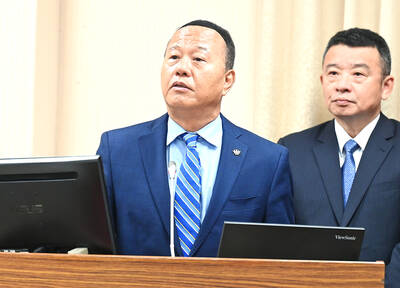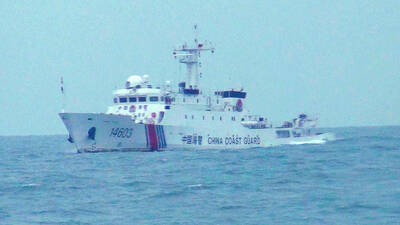The Taiwan Solidarity Union (TSU) may reconsider its position of not supporting a third recall motion in the legislature against President Chen Shui-bian (陳水扁), a TSU legislative caucus whip said yesterday.
Mark Ho (何敏豪), director of the TSU's Policy Committee, said in an interview that the caucus would hold a meeting soon to discuss whether TSU legislators should support the third recall motion or abstain from voting as they did during the two previous recall motions.
The third recall motion, launched by the Chinese Nationalist Party (KMT) and the People First Party (PFP), will be put to a vote on Nov. 24. The motion asks that a national referendum be held to determine whether the president should step down.
Ho explained that the TSU's position of opposing the third recall motion was a "temporary decision" that merited reconsideration after recent developments.
Only three days ago, the TSU expelled Taipei mayoral candidate Clara Chou (
On the same day, former Academia Sinica president Lee Yuan-tseh (李遠哲), a co-winner of the 1986 Nobel Prize for chemistry, issued an open letter urging the president to step down after a public prosecutor indicted first lady Wu Shu-jen (吳淑珍) on charges of corruption and forgery and named her and the president as "joint perpetrators" in an embezzlement case.
Lee is widely believed to have played a decisive role in helping Chen get elected as president in 2000 and win a second term in 2004.
At about the same time as Lee's open letter, an article in Taiwan News Weekly by former senior presidential adviser and I-Mei Food Co president Kao Chih-ming (高志明) -- a staunch pan-green supporter and major donor to the Democratic Progressive Party (DPP) -- also urged the president to step down to calm political turmoil.
Yesterday, Chen Shih-meng (陳師孟), who served as Presidential Office secretary-general between 2002 and 2003, also urged the president to resign in a letter to the editor carried by the Liberty Times, the Taipei Times sister newspaper.
Ho said TSU legislators planned to discuss the latest developments at a meeting and reach a decision on what policy to follow regarding the third recall motion. He stressed that nothing has been ruled out at present.
The TSU whip also said that Premier Su Tseng-chang (
The TSU holds only 12 seats in the 220-seat legislature. Even if all TSU legislators support the third recall motion, it is unlikely to pass because the KMT and the PFP would still need the support of some 20 DPP legislators to reach 147 votes and pass the two-thirds threshold.

VIGILANCE: The military is paying close attention to actions that might damage peace and stability in the region, the deputy minister of national defense said The People’s Republic of China (PRC) might consider initiating a hack on Taiwanese networks on May 20, the day of the inauguration ceremony of president-elect William Lai (賴清德), sources familiar with cross-strait issues said. While US Secretary of State Anthony Blinken’s statement of the US expectation “that all sides will conduct themselves with restraint and prudence in the period ahead” would prevent military actions by China, Beijing could still try to sabotage Taiwan’s inauguration ceremony, the source said. China might gain access to the video screens outside of the Presidential Office Building and display embarrassing messages from Beijing, such as congratulating Lai

Four China Coast Guard ships briefly sailed through prohibited waters near Kinmen County, Taipei said, urging Beijing to stop actions that endanger navigation safety. The Chinese ships entered waters south of Kinmen, 5km from the Chinese city of Xiamen, at about 3:30pm on Monday, the Coast Guard Administration said in a statement later the same day. The ships “sailed out of our prohibited and restricted waters” about an hour later, the agency said, urging Beijing to immediately stop “behavior that endangers navigation safety.” Ministry of National Defense spokesman Sun Li-fang (孫立方) yesterday told reporters that Taiwan would boost support to the Coast Guard

GLOBAL: The slogan would be advertised in popular tourist destinations in North America and Europe, such as Champs-Elysees and Times Square, the agency said “Taiwan: Waves of Wonder” is to be the country’s new tourism slogan for the next 10 years, the Tourism Administration said yesterday, adding that it would be showcased in commercials at the Olympic Games in Paris and other major cities and travel fairs around the world. The new slogan, logo and theme song, which were unveiled at a news conference in Taipei, marked the agency’s latest effort to attract 10 million international visitors to Taiwan this year, a goal that it readjusted earlier this year, as China has yet to lift its travel ban to Taiwan. The administration created the “Taiwan: Touch

BOOST TO SPORTS? The Executive Yuan said that the amendment was introduced to attract professionals to Taiwan, and increase the incentives for naturalization The Legislative Yuan yesterday passed on third reading an amendment to the Nationality Act (國籍法) that would reduce the minimum residency period required for highly skilled professionals to apply for naturalization from three to two continuous years, with a minimum of 183 days in Taiwan each year. The 183-day requirement does not apply if an eligible applicant has lived legally in the territory of the Republic of China for more than five continuous years. Taiwan’s professional basketball leagues are expected to benefit from the amendments, which would allow them to recruit more players from overseas. Prior to the passage of the amendment, the